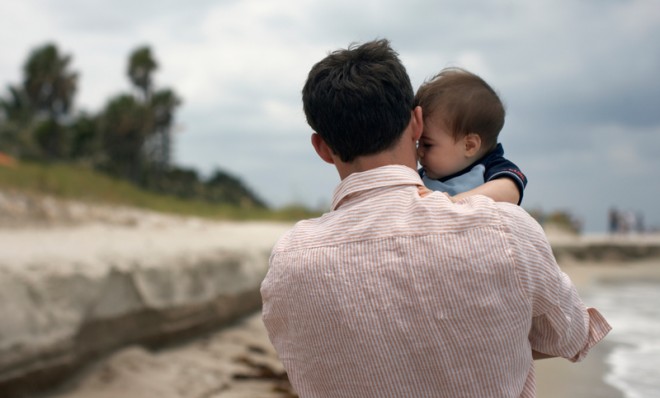Do big testicles really make for bad fathers?
That's the latest theory from science


A free daily email with the biggest news stories of the day – and the best features from TheWeek.com
You are now subscribed
Your newsletter sign-up was successful
Researchers at Emory University in Atlanta have come up with a novel finding: Fathers with small testicles are more attentive toward their children than their larger-gonadal brethren, and their brains light up more when they see photos of their children. What's more, this is the result they expected to find: That men with small balls are better dads.
Here's the theory, gleaned from observing other primates: Apes with large testes, like male chimpanzees, tend to spend their energy mating promiscuously rather than on child-rearing; those with smaller testicles, like male gorillas, tend to care for and protect their offspring. The inference is that primates with larger testicles, and thus more sperm, are really into creating children but not so much into raising them.
The study, published in the journal Proceedings of the National Academy of Science, looked at 70 fathers of children between 1 and 2 years old. The fathers and biological mothers of their children both filled out separate surveys rating their parental attentiveness — how often does he feed, bathe, change, and otherwise parent the child — and the men had their brains and testes scanned in MRI machines. The scan determined the volume of the testicles and studied how the brains reacted when shown photos of their children.
The Week
Escape your echo chamber. Get the facts behind the news, plus analysis from multiple perspectives.

Sign up for The Week's Free Newsletters
From our morning news briefing to a weekly Good News Newsletter, get the best of The Week delivered directly to your inbox.
From our morning news briefing to a weekly Good News Newsletter, get the best of The Week delivered directly to your inbox.
Men with smaller testes were rated better dads by their partners, and photos of their kids caused much more activity in the ventral tegmental area (VTR) of the brain. Dads with larger nads were rated less-involved with parenting and exhibited less activity in their brain's VTR. They also had higher levels of testosterone in blood tests than small-ball fathers.
That last finding fits nicely with research that fatherhood lowers testosterone levels in men, especially those who spend the most time with their children. But it also raises the question of cause-and-effect: Do large testicles biologically cause men to shy away from parenting duties, or are men who are naturally disinclined to change diapers more likely to have large balls?
The study doesn't try to answer that question, but lead author James Rilling, an anthropologist at Emory, says testicular biology isn't destiny. "It tells us some men are more naturally inclined to care-giving than others, but I don't think that excuses other men," he tells BBC News. "It just might require more effort for some than others." He also raises the possibility that maybe men can, um, shrink a pair through nurturing their child.
Rilling's lab is proposing a new study to see if a hormone that helps moms nurture their babies — intranasal oxytocin — can be injected into new dads to elicit a similar response. If it works, that "might suggest possible pharmacological treatment for men who lack paternal motivation," Rilling says.
A free daily email with the biggest news stories of the day – and the best features from TheWeek.com
That's why this study isn't a punchline but in fact "matters — a lot," says Belinda Luscombe at TIME. As Rilling notes, "We know in modern Western societies children with more involved fathers have better developmental outcomes," and the number of absent fathers has skyrocketed since the middle of the 20th century.
"Was there some biology involved?" Luscombe asks. Are we "at the beginning of an era when being called ballsy is no longer just a compliment," but a marital deal-breaker?
Now hold on, says CNN's Josh Levs:
Dystopian future advice mothers give to daughters before marriage: "But will he be a good father? Weigh the wedding tackle!"
So, before anyone launches such a premature declaration, know that these researchers don't claim that the size of a dude's genitals determines how good a father he'll be. And a pair of testes experts we asked to review the study point to caveats as big as a couple of boulders. [CNN]
Notre Dame anthropologist Lee Gettler also tells CNN that in order for there to be proven causality between testes size and fathering skills, bigger balls would have to be tied to more "mating." But Rilling's team doesn't show that.
And even Rilling says this isn't about being a "good" or "bad" father, per se.
"There are other things that go into being a good father," he notes. "For some men, it's working long hours so you can pay for your children to go to private school or get a good meal. For some fathers, it's playing with your children, coaching them in sports, things like that. We didn't look at any of those things."
That's important to remember, Levs says, because "across the country, many dads are doing a fantastic job, no matter what size banana hammock they would need if they were ever crazy enough to wear one, which they're not."
Peter has worked as a news and culture writer and editor at The Week since the site's launch in 2008. He covers politics, world affairs, religion and cultural currents. His journalism career began as a copy editor at a financial newswire and has included editorial positions at The New York Times Magazine, Facts on File, and Oregon State University.
